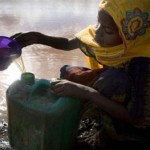
Five million people are at risk of cholera in drought-hit Ethiopia, where acute watery diarrhoea has broken out in crowded, unsanitary conditions, the World Health Organisation (WHO) said on 15 July.
“Overall, 8.8 million people are at risk of malaria and five million of cholera (in Ethiopia),” WHO spokesman Tarik Jasarevic said. Ethiopian health officials have confirmed cases of acute watery diarrhoea in the Somali, Afar and Oromiya regions of Ethiopia. “It is not confined to the refugees.”
WHO is delivering emergency health kits to Ethiopia and helping train health workers in detecting disease outbreaks. Drought across the Horn of Africa, now affecting more than 11 million people in Ethiopia, Djibouti, Kenya and Somalia, has increased the risk of the spread of infectious diseases, especially polio, cholera and measles, the WHO says.
“So far WHO has not received any report of polio cases, it really important to help countries to keep their polio-free status,” Jasarevic said.
Somalis fleeing severe drought and intensified fighting have been arriving at the rate of more than 1,700 a day in Ethiopia, where 4.5 million people now need assistance, nearly a 50 percent rise since April, he said.
Measles risk
“Two million children in Ethiopia are at risk of catching measles, a disease that can be deadly in children. Ethiopian officials reported 17,584 measles cases and 114 deaths during the first half of the year”, UNICEF spokeswoman Marixie Mercado said. “The majority of cases were in children.”
Measles has also broken out in the sprawling Kenyan Dadaab camps, with 462 cases confirmed including 11 deaths, Jasarevic said. Dadaab, an overcrowded complex of three camps, now holds some 380,000 refugees.
The United Nations carried out its first airlift of emergency supplies, since 2009, to southern Somalia — an area controlled by al Shabaab rebels — on 13 July, UNICEF said. “Ten health kits, each sufficient to treat 10,000 people over three months are also en route via road,” Mercado said.
Source: AlertNet

















